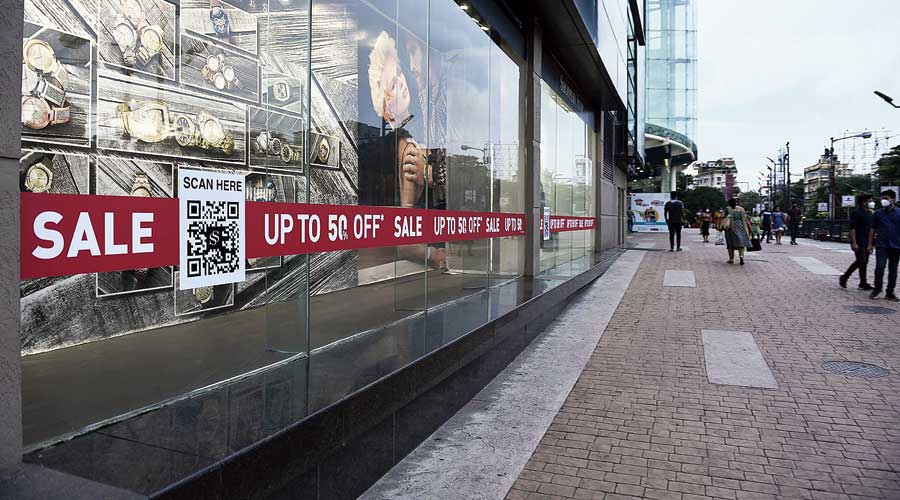Footfall is still low in the city’s malls several weeks after they resumed business. The discount season has started but that has not made much of a difference, said personnel at several stores across the malls.
The state government allowed reopening of malls from June 16. Now, malls can operate with 50 per cent capacity and bars and restaurants can remain open till 8pm.
Store personnel at malls are complaining about poor inventory and greater focus on online business. Mall owners are waiting for fresh guidelines from the state government lifting the restrictions and easing of transportation.
Many retail stores across the big malls are also merging their online and offline business for more viability.
“We would have around 10,000 pieces for a sale season at our store before the Covid pandemic. This July, we have barely 2,000 at our store,” said the store manager of a mid-level fashion brand, which has stores in several city malls. He said the procurement was the same as last year but most of the inventory was shifted to the online platform.
“The order for the procurement for a season is usually placed one year earlier. It takes about a year for the products to reach the stores from the manufacturers,” said an official of a retail garment brand. However, a bulk of the procurement for 2020 could not be sold at the stores because the malls were closed because of the pandemic and even after they opened, footfall was very low, he said.
“So, these unsold products had to be shifted to the online platforms. Learning from the pandemic, now, a bulk of the products have already been shifted online,” he said. “The focus at the store is only the traditional fashion items, while the innovative ones are kept aside for selling online.”
An official of an international footwear brand that has stores in several city malls said they have changed their policy and the online and offline selling have been merged.
“Now, a customer can see products of our offline stores on the online platform. Earlier, only the warehouse products were accessible for online customers,” said the official. Several other retail brands, too, have adopted the strategy to boost offline store sales.
Mall owners said they are not worried about the growing shift to online and are expecting the footfall to rise once the pandemic restrictions are lifted further.
“Public transport is still not freely available. Also, many are still not comfortable taking public transport unless absolutely necessary. The pandemic and lack of ease of transport is boosting online sales,” said Manmohan Bagree, vice-president, South City Group that runs South City Mall. He said the mall has had 30 per cent of its pre-pandemic footfall barely a month after reopening this time. During the first wave of Covid, it had taken three months for the mall to achieve this footfall.

“The mall is not only a shopping destination but also a hangout place. But because of the restrictions on restaurants, visitors don’t feel the urge to come to the mall now. We are expecting easier norms to be announced by the state government in August. Also, vaccination is playing a crucial role in increasing the confidence among people,” said Bagree.
He said the discount season has started but is not as aggressive as it used to be. “The brands have procured less inventories because of the lockdown restrictions. New product launches tempt customers at offline stores.”
However, Bagree feels there is no threat for the offline stores. “Online business creates aspirational buyers who can buy a brand’s products at more discounted rates. This increases brand consciousness and will compliment the offline store business, too.”
Sushil Mohta, chairman, Merlin Group, which runs Acropolis Mall, said the new scenario would not threaten the existence of stores.
“Online and offline businesses compliment each other. There are customers who want the look and feel of a product, particularly high-end designer wear or gadgets and accessories. Even if they buy online, they would prefer to check the product at a store,” said Mohta.
He said usually, the discounts provided online are on older items, launched months ago. “Even if products are sold online, the brands want to have their presence at malls where footfall is huge. This creates brand awareness.”
But for that, the footfall needs to increase. Acropolis Mall has an average footfall of 15,000 on the weekends now, compared to over 30,000 in normal times.










